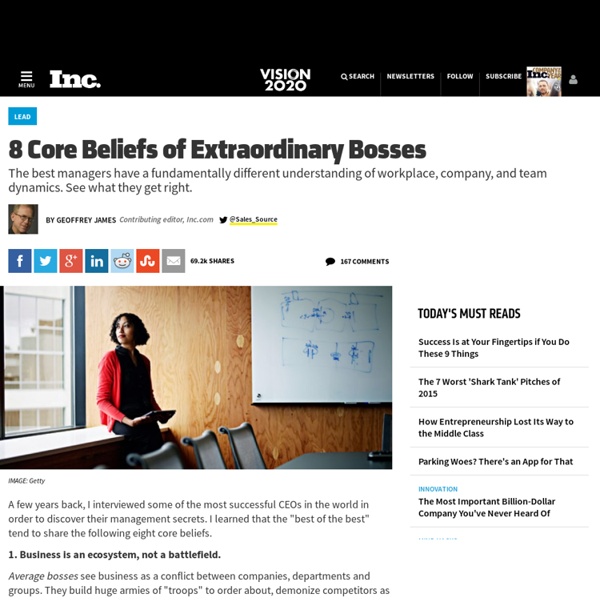How Do You Turn a Vicious Cycle of Distrust Into a Virtuous Cycle of Trust?
Very often, I see this cycle occurring in studios: I call this the "Vicious Cycle of Distrust". Having been on both sides of this cycle, I'm quite familiar with the damage it does to a culture. I've also seen the reverse of this cycle, I call a "Virtuous Cycle of Trust": I've changed the term "management" to "leadership" because a significant purpose of leadership is to drive this cycle, to create safety and purpose.
MANAGEMENT by OBJECTIVES ( MBO) - focus on achievable goals and to attain the best possible results from available resources (Your freeTen3 Business e-Coach)
What is MBO? Management by objectives (MBO) is a systematic and organized approach that allows management to focus on achievable goals and to attain the best possible results from available resources. Stretch Goals Inspiring Culture: 5 Elements
Oh Beautiful Beer - Page 12
June 14, 2013 | Designed by Marque Brand Consultants June 13, 2013 | Designed by Guru Design June 12, 2013 | Designed by Flint Design Co. June 11, 2013 | Designed by Melodic Virtue June 10, 2013 | Designed by Marcin Szewczyk June 7, 2013 | Designed by Zach Nichols
The One Skill All Leaders Should Work On - Scott Edinger
by Scott Edinger | 11:30 AM March 29, 2012 If I had to pick one skill for the majority of leaders I work with to improve, it would be assertiveness. Not because being assertive is such a wonderful trait in and of itself. Rather, because of its power to magnify so many other leadership strengths. Assertiveness gets a bad rap when people equate it with being pushy and annoying. But that shouldn’t stop you from learning to apply it productively (that is — in service to your strengths).
Weekend Reading: Becoming the Leader You Aspire To Be
Some of the world’s most renowned business executives and political leaders — including IMF Managing Director Christine Lagarde and former Florida Governor Jeb Bush — came together at The Wall Street Journal’s CEO Council this week to discuss their priorities that will shape 2015. Talk about a room full of power! How did they all rise to the top? What embodies a great leader and how can you be one, too? There’s lots of leadership advice out there. Here are three great decks that caught our attention.
Management by Objectives (MBO) - Team Management Training from MindTools
Aligning Objectives With Organizational Goals Learn how to align people's actions with your organization's goals. © iStockphoto/danleap In many organizations, it's hard to remember a time when non-managerial employees were kept in the dark about strategy. We're often reminded about the corporate mission statement, we have strategy meetings where the "big picture" is revealed to us, and we're even invited to participate in some business decisions.
Font Management in OS X
This section examines each of the various OS X releases (Panther, Tiger, Leopard, Snow Leopard, Lion, Mountain Lion, Mavericks) and provides the recommended minimum list of the fonts to be stored in the System folder for that particular release of the operating system in order for it and most third party applications to run properly. These lists also include the fonts most needed for the web, iLife and iWork. The fonts listed should always be active on your Macintosh for OS X and should not be removed. Note that this first part of Section 1 covers only fonts required in the /System/Library/Fonts/ folder.
How leaders kill meaning at work - McKinsey Quarterly - Governance - Leadership
As a senior executive, you may think you know what Job Number 1 is: developing a killer strategy. In fact, this is only Job 1a. You have a second, equally important task.
4 Secrets of Great Critical Thinkers
In 2009, J D Wetherspoon, a chain of more than 800 pubs in the UK, was facing declining sales. Demand for beer had been down for five years. In addition, pricing pressure from super market chains was intense, and higher alcohol taxes further squeezed its already tight margins. What would you say is the company's real business problem? Most people see it as a sales problem and recommend better marketing and promotion.
How Much Do Our Employees REALLY Love Their Job?
Helen Fisher, Ph.D is a biological anthropologist and chief scientific advisor to the Internet dating site Match.com. Helen’s life work is centered around the Three Loves Theory, which helps us better understand our relationships. The Three Loves Theory basically says not all love we feel is experienced equally. Fisher has studied the cognitive and neurobiological processes underlying attraction and love, and has begun to pinpoint different emotions that occur at different stages of romantic relationships. She believes we have three kinds of love: Lust, Passion and Commitment. So, what does this have to do with Human Resources?
Use S.M.A.R.T. goals to launch management by objectives plan
Management by Objectives, or MBO, is a management strategy that uses the S.M.A.R.T. goals method--setting objectives that are specific, measurable, achievable, realistic, and time-based. This article discusses the first steps toward implementing this management method in your department. Management by Objectives, or MBO as it is affectionately called, is a concept expressed by Peter Drucker more than 50 years ago.



